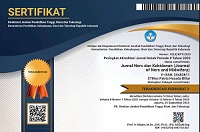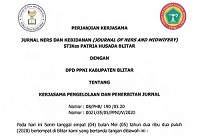The Impact of Reproduction Health Education Using Peer Mentoring Method Towards the Knowledge Level of Patients with Sexuality Transmitted Infection
DOI:
https://doi.org/10.26699/jnk.v8i3.ART.p284-289Keywords:
Health Education, Peer Mentoring Methods, Knowledge, Sexually Transmitted InfectionsAbstract
Sexuality transmitted infections are often also reffered to as veneral diseases. The spread can be from blood, sperm, or can also be transmitted from mother to fetus during pregnancy and birth, and through the blood and body tissues. In addition, spread can also without sexual intercourse, it can be from the use of syringes repeatedly or alternately, among people, as well as the risk of transmitting infection. The aim of this study was to determine the influence of reproduction health education using peer mentoring method towards the knowledge level of patients with sexuality transmitted infection. The study used one group pretest-posttest design. The data was collected by using a questionnaire. The respondent was selected by using total sampling technique and 27 respondents were obtained. The data was analyzed by using the Wilcoxon test. The result of the ï² value = 0,000, which meant ï² value < α (α = 0.05) there was an effect of reproduction health education using peer mentoring method towards the knowledge level of patients with sexuality transmitted infection. For researchers, next expected can be used as information to developed a method of information in other research.References
Aulia, E. (2014). Peran dan fungsi perawat komunitas sebagai pendidik. Juni 6, 2014. Diakses dari https://groups.google.com
Dharmawati , A. I. G. A. & Wirata, I. N. (2016). Hubungan Tingkat Pendidikan, Umur, dan Masa Kerja. Jurnal Kesehatan Gigi, Volume 4, p. 2.
Dinas Kesehatan Kabupaten Kediri. (2013). Laporan Kejadian Infeksi Menular Seksual. Kediri: Bidang P2P.
Grant, C.S. (2015). Mentoring: empowering your sucess. in: grant PAPS, Editor. Success Strategies From Women in STEM (Second edition). San Diego: Academic Press.
Herawati, Y.E. (2007). Hubungan Antara Pengetahuan Tentang
Penyakit Menular Seksual dan Sikap Terhadap Seks Bebas
Pada Remaja Akhir. Skripsi (tidak dipublikasikan). Semarang: Fakultas Psikologi Universitas Kristen Soegijapranata.
Ismail,A.,Abdulah,N.,Zaedy,NI.,Ghani,AA.,Omar,N. (2015). Mentoring Program as an Instrument of Enhancing Mentees’ Self-Efficacy. Acta Universitatis Danubius. Communicatio, Vol 9, No 1
Kementrian Kesehatan Repubik Indonesia. (2013). Pedoman Nasional Tes Dan Konseling HIV Dan AIDS. Jakarta: Kementrian Kesehatan Republik Indonesia.
Kim, K.H., & Zabelina, D.L. (2011). Mentors in: pritzker marr, editor. Encyclopedia of Creativity (Second Edition). San Diego: Academic Press.
KPAN. (2010). Strategi dan Rencana Aksi Nasional Penanggulangan HIV dan AIDS. KPA. Depkes RI.
Najmah. (2016). Epidemiologi Penyakit Menular. Jakarta: Trans Info Media.
Nari, J. (2015). Analisis Faktor-Faktor yang Berhubungan dengan Kejadian IMS pada Remaja di Klinik IMS Puskesmas Rijali dan Passo Kota Ambon. Jurnal Promosi Kesehatan Indonesia, Vol. 10 / No. 2 : 131-143.
Norwood, A.W. (2010). The Lived Experience of Nurse Mentors: Mentoring nurses in the proffesion. Disertasi. Missouri: Faculty of The Graduate School University of Missouri-Columbia.
Notoatmodjo, S. (2010). Metodologi Penelitian Kesehatan. Jakarta : Rineka Cipta.
Notoatmodjo, S. (2015). Promosi kesehatan dan Perilaku Kesehatan. Jakarta: Rineka Cipta.
Notoatmodjo, S. (2015). Metodologi Penelitian Kesehatan. Jakarta : Rineka Cipta.
Noviyani, D. (2017). Perilaku Sekszual Berisiko Infeksi Menular Seksual (IMS)
Pada Kelompok Lesbi Di Kota Semarang. Journal of Health, Vol 2 (2) : 122-129.
Oktaviani, T., dkk. (2015). Pengaruh Pendidikan Kesehatan Reproduksi Menggunakan Metode Mentoring Terhadap Pengetahuan Remaja Tentang
Kesehatan Reproduksi. Ners Jurnal Keperawatan. Volume 11, No 1, 41-51.
Potter & Perry. (2009). Fundamental Keperawatan. Edisi 7. Jakarta: Salemba Medika.
Prasanti, D., Fuady, I., & Indriani, S.S. (2017). Optimalisasi Bidan Desa Dalam Penyebaran Informasi Kesehatan Bagi Masyarakat di Kabupaten Bandung. Jurnal Komunikasi. Volume 13, Nomor 1 Oktober 2018.
Rhodes, J.E., Lowe, SR., & Schwartz, SEO. (2011). Mentor relationships. in: prinstein. Editor. Encyclopedia of Adolescence. San Diego: Academic Press.
Rohmawati, I. (2011). Faktor-Faktor yang Berhubungan Dengan Perilaku Wanita Usia Subur Dalam Deteksi Dini Kanker Serviks Metode IVA di Wilayah Kerja Puskesmas Ngawen 1 Kabupaten Gunung Kidul Tahun 2011. Skripsi. Jakarta: FKM UI.
Sari, K.P., Muslim, M.H., & Ulfah, S. (2012). Kejadian Infeksi Gonorea Pada Pekerja Seks Komersial di Lokalisasi Pembantuan Kecamatan Landasan Ulin Banjarbaru. Jurnal Buski, Vol. 4 (1) : 29-35.
Sari, Y.P., Mulyanti, L.D., & Oktriani, T. (2015). Pengaruh Pendidikan Kesehatan Reproduksi Menggunakan Metode Mentoring Terhadap Pengetahuan Remaja Tentang Kesehatan Reproduksi. Ners Jurnal Keperawatan, Vol 11, No 1 : 43-50.
Sulistiyowati, E.E. (2009). Analisis Pelaksanaan Mentoring Dalam Pembentukan Konsep Diri Pelajar SMA Pada Lembaga ILNA Youth Centre Bogor. Januari 2, 2019. Diaksespada http://EkoEndahSulistiyowati.Pdf.
Taufia, D. (2017). Faktor-faktor yang Berhubungan dengan Perilaku Wanita Pasangan Usia Subur (PUS) dalam Deteksi Dini Kanker Leher Rahim Metode IVA Di Wilayah Kerja Puskesmas Nanggalo Padang Tahun 2017.
Downloads
Published
How to Cite
Issue
Section
License
Copyright (c) 2021 Jurnal Ners dan Kebidanan (Journal of Ners and Midwifery)

This work is licensed under a Creative Commons Attribution-ShareAlike 4.0 International License.






